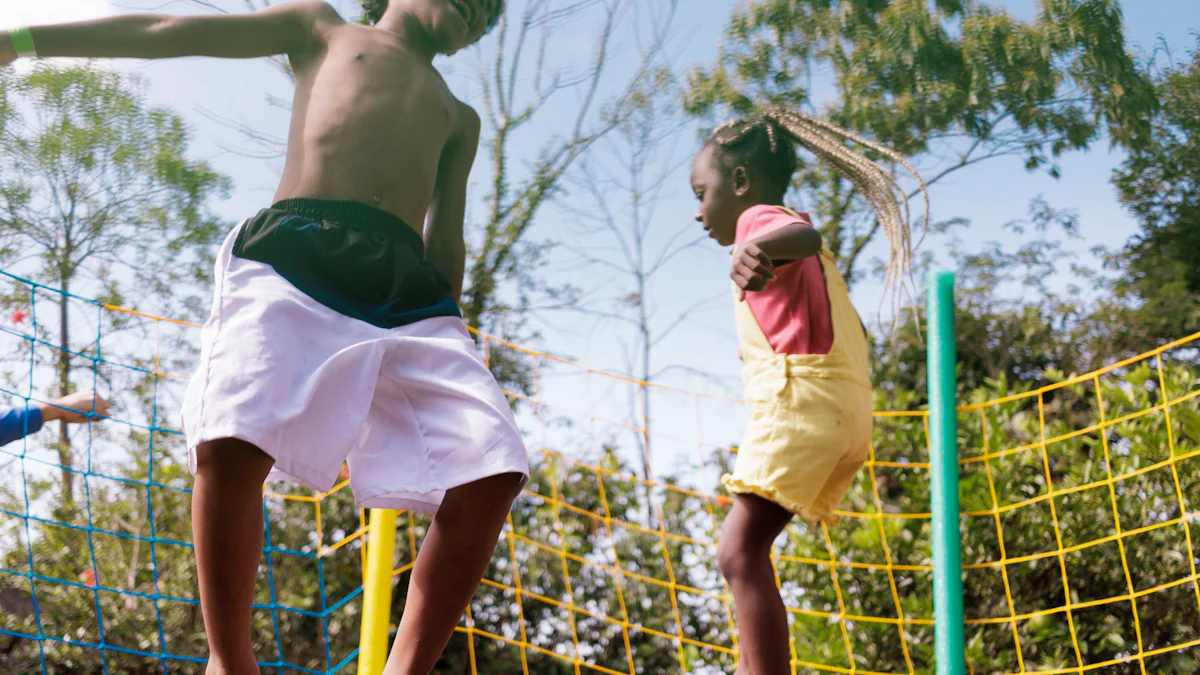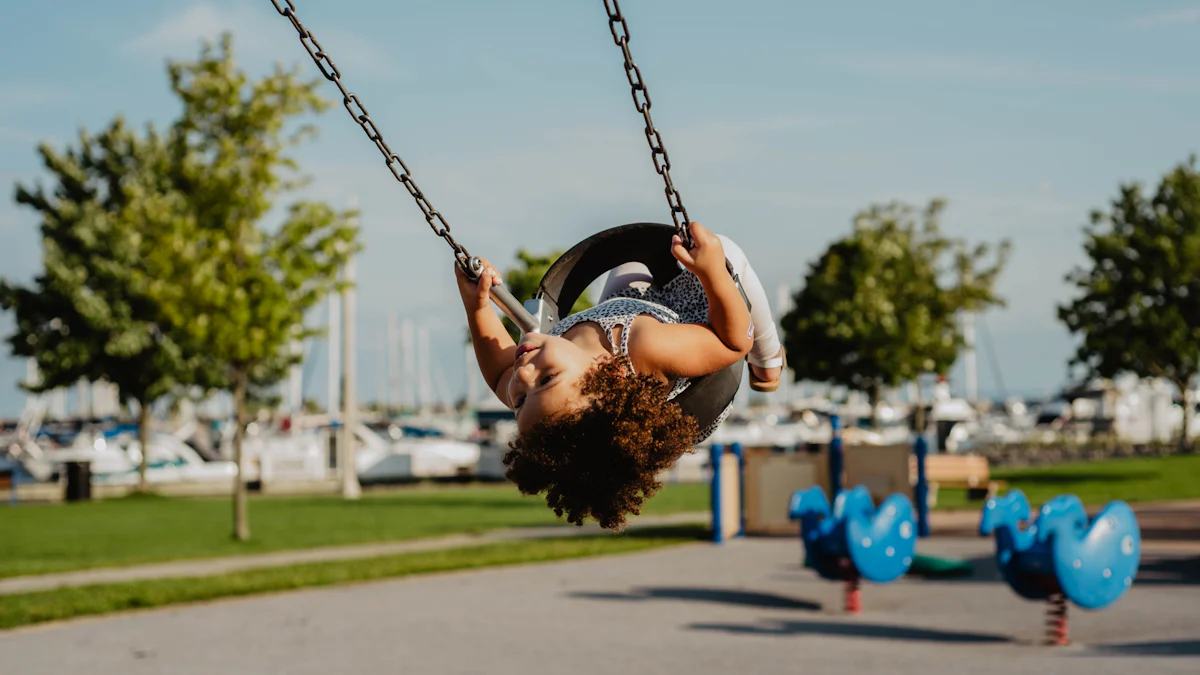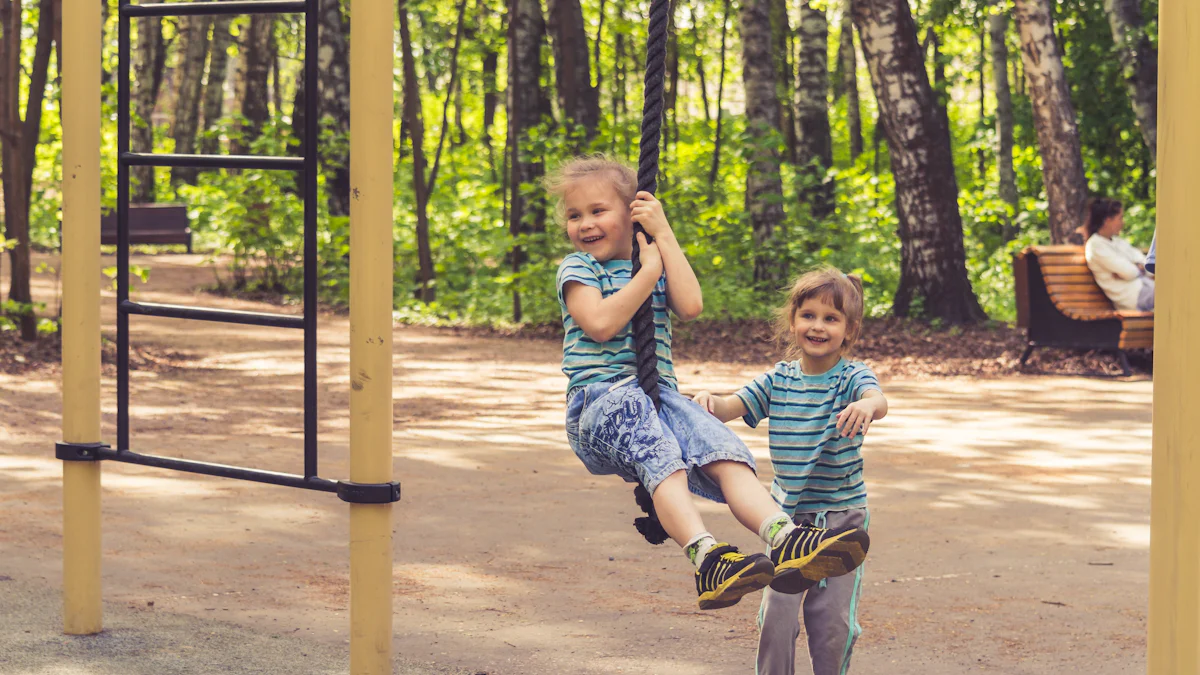The Importance of Outdoor Play for Child Development

Outdoor play acts as a vital component of early childhood development. Children experience growth in creativity and imagination through outdoor activities. Early exposure to nature fosters problem-solving skills and emotional resilience. The Department of Early Childhood Education emphasizes the importance of outdoor environments. Limited outdoor time can lead to issues like childhood obesity and stress. Early engagement with nature nurtures a lifelong appreciation for the world. The Department encourages parents to prioritize outdoor experiences for holistic growth.
General Benefits of Outdoor Play
Physical Health Benefits
Improved Fitness and Strength
Outdoor play in early childhood significantly enhances physical fitness and strength. Children engage in activities like running, jumping, and climbing. These activities build muscle and improve cardiovascular health. The importance of outdoor play becomes evident as children develop stronger bones and muscles. The National Centers for Disease Control and Prevention highlight the importance of regular physical activity. Outdoor play offers a natural and enjoyable way for children to stay active.
Enhanced Motor Skills
Outdoor environments provide ample opportunities for children to refine motor skills. Activities such as balancing on logs or climbing trees enhance coordination. Children learn to control their bodies and movements. This development is crucial during the early years. Claire McCarthy, a renowned pediatrician, emphasizes the importance of outdoor play for motor skill development. Allowance for free movement in outdoor settings fosters agility and spatial awareness.
Emotional Well-being
Stress Reduction
Outdoor play in early childhood serves as a powerful stress reliever. Nature's calming effect helps children unwind and relax. The importance of outdoor play lies in its ability to reduce anxiety. Claire McCarthy notes that exposure to nature soothes the mind. Children feel more at ease and open to share their feelings. The allowance for unstructured playtime outdoors promotes emotional balance.
Boost in Self-esteem
Outdoor play in early years boosts self-esteem and confidence. Children accomplish tasks like climbing a tree or building a fort. These achievements foster a sense of pride and accomplishment. Claire McCarthy highlights the importance of outdoor play in building self-worth. Children feel empowered and open to share their successes. The allowance for exploration and creativity strengthens self-assurance.
Intellectual Growth
Stimulating Creativity
Outdoor play in early childhood ignites creativity and imagination. Natural settings inspire children to invent games and stories. The importance of outdoor play lies in its ability to stimulate creative thinking. Claire McCarthy emphasizes the role of nature in fostering imagination. Children feel open to share their ideas and creations. The allowance for imaginative play nurtures cognitive development.
Problem-solving Skills
Outdoor play in early years enhances problem-solving abilities. Children face challenges like navigating obstacles or building structures. These experiences teach critical thinking and decision-making. The importance of outdoor play becomes clear as children develop resilience. Claire McCarthy advocates for outdoor play as a means to cultivate problem-solving skills. Children feel open to share solutions and collaborate with peers. The allowance for trial and error encourages independent thinking.
Social Development
Building Friendships
Outdoor play offers children a unique platform to build friendships. Natural settings encourage interaction and cooperation. Children engage in shared activities like games or exploration. These experiences foster bonds and mutual understanding. The joy of discovery creates lasting connections. Children learn to communicate and express themselves openly. This environment nurtures empathy and compassion. The Freedom of Information Act highlights the importance of outdoor spaces for community building. Children develop social skills that last a lifetime.
Learning Teamwork
Outdoor play teaches children the value of teamwork. Group activities require collaboration and problem-solving. Children learn to listen and respect diverse opinions. Working together on tasks like building a fort enhances cooperation. Success in these endeavors boosts confidence and self-esteem. Children experience the joy of achieving goals collectively. This fosters a sense of belonging and unity. Outdoor play promotes mental health by reducing stress and anxiety. Children feel empowered to take initiative and lead. The call to embrace outdoor activities strengthens community ties.
Health Benefits of Outdoor Play

Physical Health
Cardiovascular Health
Outdoor play for children offers a fantastic way to boost cardiovascular health. Activities like running and jumping get the heart pumping. Regular movement strengthens the heart and improves circulation. The Department of Health and Human Services (HHS) emphasizes the need for daily physical activity. Outdoor environments provide a natural setting for children to stay active. Fresh air and open spaces encourage continuous movement. Children develop a love for exercise that lasts a lifetime.
Bone and Muscle Development
Outdoor play for children supports strong bone and muscle development. Climbing, balancing, and lifting objects build strength. Exposure to sunlight aids in vitamin D production, essential for bone health. Children gain advanced motor skills through diverse activities. The natural terrain challenges muscles in unique ways. Children become more agile and coordinated. Outdoor play fosters a robust physical foundation.
Mental Health
Reducing Anxiety
Outdoor play for children serves as a powerful tool to reduce anxiety. Nature's calming effect soothes the mind. Children feel free to explore and express themselves. Unstructured playtime allows for relaxation and stress relief. The Health and Human Services department highlights the mental benefits of outdoor activities. Children experience a sense of peace and joy in natural settings. Outdoor environments promote emotional balance and well-being.
Enhancing Mood
Outdoor play for children enhances mood and overall happiness. Sunshine and fresh air lift spirits. Engaging with nature boosts serotonin levels. Children feel more energetic and positive. Outdoor play encourages laughter and fun. Social interactions during playtime build friendships. Children develop confidence and independence. The joy of discovery and adventure enriches life. Outdoor play creates lasting memories and a sense of fulfillment.
Emotional Benefits of Outdoor Play
Emotional Resilience
Coping with Challenges
Children playing outdoors enjoy opportunities to face and overcome challenges. Nature Explorers in Ireland have found that outdoor environments present unique obstacles. Children learn to navigate these obstacles, building resilience. Early Childhood Playground Equipment also provides a platform for developing coping skills. The Museum of Sonoma County highlights how children experience freedom in outdoor play. This freedom fosters a sense of accomplishment and confidence. Google Scholar supports the idea that overcoming challenges strengthens emotional resilience.
Developing Patience
Outdoor play encourages patience in children. Harvard Health Publishing notes that nature's pace teaches children to wait and observe. Children learn to appreciate the gradual changes in their environment. Northern Ireland studies show that outdoor activities require patience and persistence. Children develop the ability to wait for results, enhancing their emotional growth. Allowing children to engage in outdoor play nurtures this vital skill. California Naturalist programs emphasize the importance of patience in nature exploration.
Emotional Expression
Freedom to Express
Children experience freedom to express emotions during outdoor play. The Museum of Sonoma County observes that natural settings encourage open expression. Children feel safe to share their feelings without judgment. Harvard research indicates that outdoor play promotes emotional openness. Google Scholar supports the link between nature and emotional expression. American children benefit from this freedom, developing healthier emotional habits. Early Education by Johnson emphasizes the role of outdoor play in emotional development.
Understanding Emotions
Outdoor play helps children understand their emotions. Boston Children studies reveal that nature provides a reflective space. Children learn to identify and process their feelings. Harvard Health Publishing highlights the calming effect of outdoor environments. Google Scholar shows that nature encourages emotional awareness. Museums often incorporate outdoor spaces to facilitate emotional learning. Northern Ireland educators promote outdoor play for emotional understanding. California Naturalist programs also focus on emotional awareness through nature.
Intellectual Benefits of Outdoor Play
Outdoor play offers significant development benefits for children. Natural environments provide unique opportunities to enhance cognitive skills. Children engage in activities that stimulate the mind and foster growth.
Cognitive Development
Enhancing Concentration
Outdoor environments help children focus better. Nature provides a calm setting that minimizes distractions. Children learn to concentrate on tasks like observing wildlife or building structures. This focus translates into improved attention spans. The ability to concentrate enhances overall learning experiences.
Encouraging Curiosity
Children naturally explore their surroundings. Outdoor play encourages curiosity and discovery. Kids ask questions about plants, animals, and weather. This curiosity leads to a deeper understanding of the world. Learning becomes an exciting adventure. Curiosity-driven exploration fosters a lifelong love for learning.
Academic Performance
Improved Focus
Outdoor play improves academic performance by enhancing focus. Children return to indoor learning environments with renewed energy. The fresh air and physical activity boost mental clarity. Kids find it easier to concentrate on schoolwork. Improved focus leads to better academic outcomes.
Better Learning Outcomes
Constructive play in natural settings benefits kids intellectually. Children develop problem-solving skills through hands-on experiences. These skills translate into better learning outcomes in school. Kids learn to approach challenges creatively. The alliance between outdoor play and education strengthens intellectual growth.
Access to outdoor learning environments is crucial. Programs like Access Program support this initiative. The Dow Event Center advocates for more outdoor spaces. Art and nature combine to create enriching experiences. Children gain a well-rounded education through outdoor exploration.
Social Benefits of Outdoor Play

Outdoor play offers children a unique opportunity to develop essential social skills. The Centers of Fairfield County emphasize the importance of these interactions for holistic growth. Children learn to communicate effectively and resolve conflicts in natural settings. The Learning Centers of Fairfield provide environments where children can thrive socially.
Social Skills
Communication Skills
Outdoor play enhances communication skills among children. Children engage in conversations while playing games or exploring nature. These interactions help them express thoughts and feelings clearly. The Centers of Fairfield County highlight the role of outdoor play in fostering verbal and non-verbal communication. Children learn to listen actively and respond appropriately. This skill becomes a valuable asset in various life situations.
Conflict Resolution
Children often face conflicts during outdoor play. These situations teach them how to resolve disagreements peacefully. The Learning Centers of Fairfield encourage children to find solutions collaboratively. Children learn to understand different perspectives and compromise. This process strengthens their ability to handle conflicts in the future. The Centers promote outdoor activities that nurture these vital skills.
Cultural Awareness
Exposure to Diversity
Outdoor play exposes children to diverse cultures and backgrounds. The Centers of Fairfield County create inclusive environments for children from various communities. Children learn to appreciate differences and embrace diversity. The Learning Centers of Fairfield organize events that celebrate cultural heritage. Children gain a broader understanding of the world around them. This exposure fosters empathy and acceptance.
Understanding Social Norms
Outdoor play helps children understand social norms and expectations. The Centers of Fairfield County provide guidance on appropriate behavior in different settings. Children learn to follow rules and respect boundaries. The Learning Centers of Fairfield emphasize the importance of social etiquette. Children become aware of societal norms through observation and interaction. This understanding prepares them for future social interactions.
The Centers of Fairfield County and the Learning Centers of Fairfield play a crucial role in promoting outdoor play. These centers offer programs that support children's social development. The Department of Health recognizes the benefits of outdoor activities for child maintenance. Parents and caregivers can leave comments on the positive impact of these programs. The Centers ensure that children receive the best care and opportunities for growth.
Outdoor play holds immense importance for children's development. Children gain physical strength, emotional resilience, and social skills through early outdoor experiences. Outdoor play fosters creativity and problem-solving abilities. The importance of outdoor play lies in its ability to nurture well-rounded individuals. Encourage children to explore nature and engage in outdoor activities. Parents and educators should prioritize outdoor play for early childhood growth. Outdoor play builds confidence and independence in children. Children learn cooperation and teamwork through shared outdoor experiences. Early exposure to nature cultivates a lifelong appreciation for the environment.
See Also
The Significance of Play for Children's Growth
Parental Influence on Nurturing Kids' Inquisitiveness
Easy Ways to Engage Children with the Outdoors
Family Schedules and Building Strong Children
Promoting Inquiry: The Essential Role of Questioning in Kids' Growth

